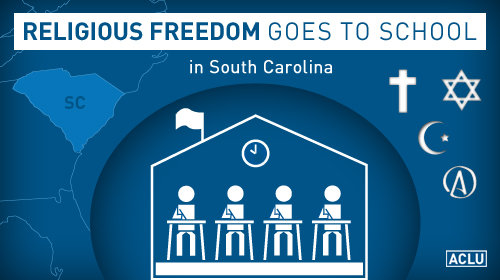
By Harrison Hopkins
Harrison Hopkins graduated in 2011 from Laurens District 55 High School in Laurens, South Carolina. He is currently a sophomore at Presbyterian College in Clinton, SC, where he is the founder and current president of the Secular Student Alliance at Presbyterian College. His blog is part of this week’s “Religious Freedom Goes to School” blog series. Share your story about religious freedom in South Carolina’s public schools by reporting potential religious freedom violations to us.
Throughout elementary, middle, and high school, we constantly hear about how the United States was founded on religious freedom, how we are a “salad bowl” of people with a variety of ideas, cultures, and personal beliefs, and how we should respect these differences among people. Imagine my surprise when I found out, after being taught this for so many years, that my high school was going to put the choice of whether or not to have an explicitly Christian prayer at our graduation ceremony up to a vote by the graduating class.
At first, I felt powerless to object. “Majority rules,” right? After a bit of research, however, I found out that this was wrong. In fact, our Constitution guarantees that the majority cannot interfere with the minority’s fundamental constitutional and human rights. It’s kind of the entire point of our Bill of Rights. Constitutional rights are sacred and we do not put them up to a vote.
With this in mind, I started to think. How many students throughout the years had been made uncomfortable by this practice? How many felt excluded? How many had wanted to say something, but didn’t out of fear of repercussions from classmates or even their own family?
These questions are part of what pushed me to contact the ACLU. Letters were sent to the school explaining why this vote was illegal, and a week later, the school said that it would cancel the vote. It seemed like we had won, but things are never that simple.
In the weeks leading up to graduation, word got out that I had complained about the prayer vote and that it had been cancelled. Parents found out, news agencies were called, and petitions were passed around the community. All eyes were on me wherever I went in the school. Finally, the day of graduation came along, and, to my disappointment, there was still a prayer. Parents and students rejoiced, under the impression that they had won.
But they didn’t.
All they managed to do was to inspire me to become an activist. Since then, I have been reaching out to those in similar situations and doing everything I can to let them know: you are not alone. I’ve met people throughout South Carolina and from around the country also working to protect religious freedom. We all have the same idea in mind: Separation of church and state is important and needs to be protected in order for religious freedom and freedom of belief to truly thrive.
And if I and others I have met as a result of my experience in public school have anything to say about it, it will be.
Learn more about religious freedom in public school: Sign up for breaking news alerts, follow us on Twitter, and like us on Facebook.



